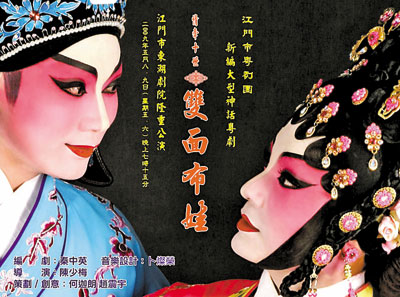
WANFENG Guangdong Opera Troupe, the only Chinese opera troupe protected as an intangible cultural heritage in Shenzhen, was recently disbanded due to low profits, local Chinese-language media reported.
A new troupe, Haoxiang Guangdong Opera Troupe, is expected to form this month and will include key members of the Wanfeng troupe, according to reports.
The dismissal of the Wanfeng troupe had not been announced officially, but reports said authorities asked the troupe to suspend its operations and performances in June because of revenue problems.
“I was one of the first people to hear the news, and I felt a lot of pity for the troupe. The troupe was one of only two village-level professional opera troupes in the country and gave many outstanding performances,” said Wang Chengtai, director of the city’s intangible cultural heritage protection center.
As a Shenzhen intangible cultural heritage project, the troupe, known by fans as the “Shenzhen No. 2 Guangdong Opera Troupe,” was started and maintained by the Pan family in Wanfeng Village, Shajing Subdistrict, Bao’an District. In recent years, it became an independent, cultural performing troupe without any financial support from the village. It gave numerous performances of Guangdong operas, some of which won national or provincial awards.
The village ultimately decided to disband the troupe.
“People now have a lot of ways to spend their leisure time. Guangdong opera has a very small market,” a village official said.
Wang said the Wanfeng troupe struggled severely to survive independently.
“The village did not give any support, including financial support or resources, to the troupe. Members of the troupe had to make a living on their own,” Wang said. “Luckily, a new troupe was founded with support from the Shajing Subdistrict Office. As Shajing is known for its oysters, the new troupe will be called Haoxiang Guangdong Opera Troupe (Oyster County Guangdong Opera Troupe).”
Luo Huifen, former head of the Wanfeng troupe and president of the Haoxiang troupe, said the transition is almost complete.
The Haoxiang troupe has only 15 members at the moment, compared with Wanfeng’s 30. Only six of the Haoxiang members are actors or actresses. Luo is the troupe’s president, accountant and saleswoman, and an actress.
“We don’t even have special people for costumes, and just help each other with makeup,” she said. “My biggest hope is that the new troupe will survive.”
Because of its small size, the new troupe can only perform some scenes of most traditional Guangdong operas. But they’re adjusting, Luo said. “We have already prepared some new plays, which the Wanfeng troupe never performed,” she said.
Most of the Haoxiang members were born in the 1980s or 1990s. When they don’t have performances, they rehearse at the village hall in Xinqiao No. 2 Village in Shajing. They rehearse or perform nearly every night.
“We appreciate the support given by the Bao’an District Government very much. Without it, the new troupe wouldn’t be able to start so soon. Initially, we’re only focusing on how to improve our performances and gain a bigger market.”
Wang was confident about the Haoxiang troupe’s development.
“It doesn’t matter how many people there are in the troupe as long as they can protect the old traditions and introduce them to more people,” he said. “They should also work on training new members so it can be passed on by generations.”
Wang said the transition shouldn’t affect the development of Guangdong opera in Shenzhen.
“Guangdong opera has been performed in Wanfeng Village since the Ming Dynasty (1368-1644). The village has developed its opera very well since then and once was an important base for Guangdong opera in the city,” Wang said.
“Protecting the troupe means protecting a piece of history in Shenzhen. However, the troupe that plays an even more significant role in promoting the city’s Guangdong opera should be the Shenzhen Guangdong Opera Troupe, which was founded in the 1960s.”
Wang said more efforts will be undertaken to protect and promote Guangdong opera in Shenzhen. His center plans to help the city-level troupe apply for provincial or even national recognition as an intangible cultural heritage.
(Wang Yuanyuan)
|

